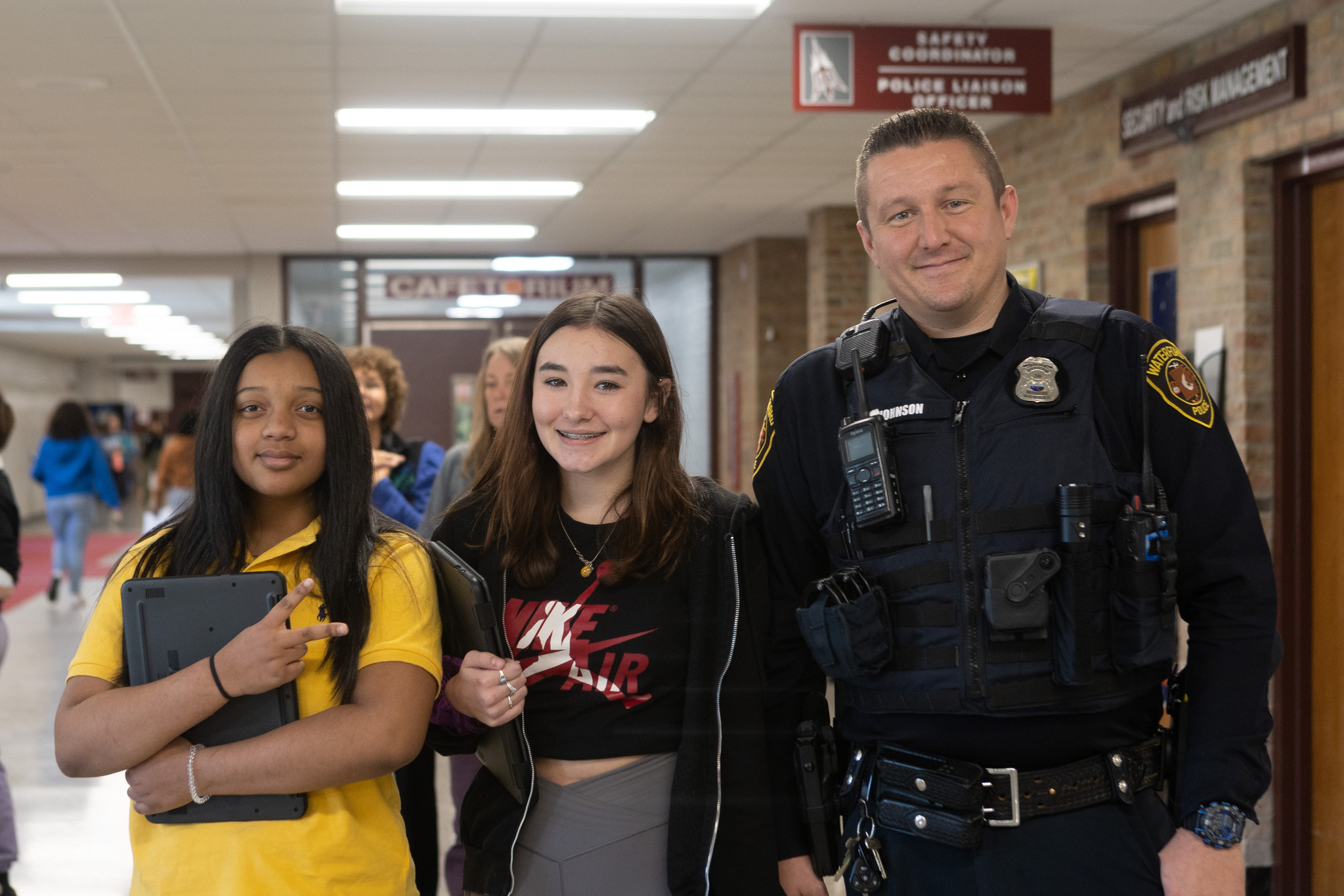Safety & Security
The Waterford School District continues to take proactive measures to protect the safety of all our students and staff members. The Waterford School District meets regularly with local police and fire responders who help plan our community's response to potential threats. Our plans are made in concert with all other local emergency preparedness plans.
Incident Management Plans
The school district and all school facilities have incident management plans. The plans have been designed with the help of school security, as well as local law enforcement, emergency management, and public health officials. Plans are regularly reviewed and updated. These plans include procedures to respond to critical incidents, such as fire or tornado, and school crisis teams practice these drills regularly.
Emergency Actions
The actions taken during any type of emergency situation depend a great deal on the specifics of the incident. For example, one or more schools may evacuate, lock down, or initiate a shelter-in-place response, according to the nature of the threat. The main objective is the protection of the students and staff members. School administrators have a variety of "tools" to use and have received training on how to work with each of these. The ability to remain flexible is a key component of each school's plan and of district-wide preparations. Additionally, Waterford School District officials would follow direction from public safety officials.
Safety Questions or Concerns?
If you have questions about your child or about your school's safety and support responses, please contact your principal. Everyone in the Waterford School District continues to work to make all our schools safe and secure environments for all our students.
WSD Safety Hotline: 248-674-6122
Online Citizens Police Reporting
News & Resources
Protect Mi Child
Parents can sign up for the state’s ProtectMiChild Registry. ProtectMiChild is a free and secure program that keeps kids safe from adult-oriented advertising via social media, text, and email. Parents can register their children’s social media handles, phone numbers, and email addresses to block ads for products like alcohol, tobacco, pornography, and online gambling.
Human Trafficking
Human trafficking affects individuals across the world and right here in Michigan. According to the U.S. Department of Justice, human trafficking is a danger regardless of the age, gender, ethnicity, and/or socio-economic backgrounds of its victims.
- Human trafficking is a form of modern-day slavery in which people profit from the control and exploitation of others. This crime occurs when a trafficker uses force, fraud, or coercion to control another person for the purpose of engaging in commercial sex acts or soliciting labor or services against his/her will while receiving little or no compensation. Victims include both children and adults.
- Sex trafficking is found in a wide variety of venues within the commercial sex industry, including residential brothels, escort services, fake massage businesses, strip clubs, and street prostitution. Minors under the age of 18 engaging in commercial sex are considered victims of human trafficking, regardless of whether or not there was use of force, fraud, or coercion. Minors engaging in “survival sex” to obtain basic necessities such as food, shelter, or transportation are also considered victims.
- Labor trafficking is found in diverse labor settings, including domestic work in hotels, massage parlors, nail salons, small businesses, large farms, and factories. Under Michigan law, minors under the age of 18 engaging in forced labor are considered victims of human trafficking, regardless of whether or not there was use of force, fraud, or coercion.
How do traffickers acquire their victims? Most often through manipulation, control, and targeting the vulnerable. Ways to protect young people online include:
- Setting strict privacy settings – Consider setting accounts to private and turning off location sharing on posts.
- Beware of strange friend requests – Teach them to only accept friend requests from people they know, even if they have friends in common. Traffickers have reached out to strangers to ‘chat’ via social media and then slowly work to build trust with potential victims.
- Don’t overshare – Everything put online is in the public domain, including personal information such as phone numbers, addresses, and live locations.
- Flag it, don’t share it – Teach them to not hesitate to unfriend, block or report someone who is harassing them or talking to them in a way they don’t like. They should take screenshots of the messages or posts. They might be useful later in an investigation.
- Get help or raise the alarm – Suspected human trafficking can be reported to federal law enforcement by calling 1-866-347-2423. Help is available from the National Human Trafficking Hotline at 1-888-373-7888. The Michigan Department of Attorney General also has information on their website.
‘Take it Down’ Helps Young People Remove Explicit Online Images
The National Center for Missing & Exploited Children is helping launch a free service called Take it Down. This service helps children and teens remove online nude, partially nude, or sexually explicit photos and videos without sharing any of their personal information with the service.
The program works by assigning a unique digital code, called a hash value, to the specific image or video. Tech companies use the hash value to scan their public or unencrypted services to detect and remove the image or video. No individual will look at the image or video. To learn more, visit https://takeitdown.ncmec.org/
OK2SAY, Michigan’s Student Safety Program, is seeing an increase in tips that involve adults coercing students into producing sexual images and videos online, a crime called sextortion. It is a form of blackmail in which sexual information or images are used to extort sexual favors or money from the victim. They may even threaten to harm the victim’s friends or relatives unless the victim complies with their demands.
Students need to know that while they cannot go back and change what happened, they can get help and move forward. Please consider talking to students about this service.

Safety Documents
Drill Reporting Summary Reports
Drill Reporting Summary 2022-2023
Drill Reporting Summary 2021-2022
Drill Reporting Summary 2020-2021
Drill Reporting Summary 2019-2020
Safety & Preparedness
Personal Emergency Preparedness
Post Crisis Parent Tips
Safety Review
School Emergency Preparedness
Smoking & Tobacco Use








